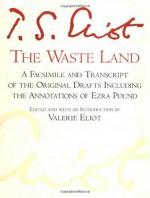|
This section contains 1,128 words (approx. 4 pages at 300 words per page) |

|
Modernism in T.s. Eliots's the Wasteland
Modernism has been defined as a rejection of traditional 19th-century norms, whereby artists, architects, poets and thinkers either altered or abandoned earlier conventions in an attempt to re-envision a society in flux. In literature this included a progression from objectivist optimism to cynical relativism expressed through fragmented free verse containing complex, and often contradictory, allusions, multiple points of view and other poetic devices that broke from the forms in Victorian and Romantic writing, as can be seen in T.S. Eliot's "The Waste Land" (Levanson).
The varied perspectives or lack of a central, continuous speaker uproots "The Waste Land" from previous forms of poetry; however, it is not simply for the sake of being avant-garde, but to espouse the modernist philosophy, which posits the absence of an Absolute and requires the interpretation of juxtaposed, irreconcilable points of view in order to...
|
This section contains 1,128 words (approx. 4 pages at 300 words per page) |

|


